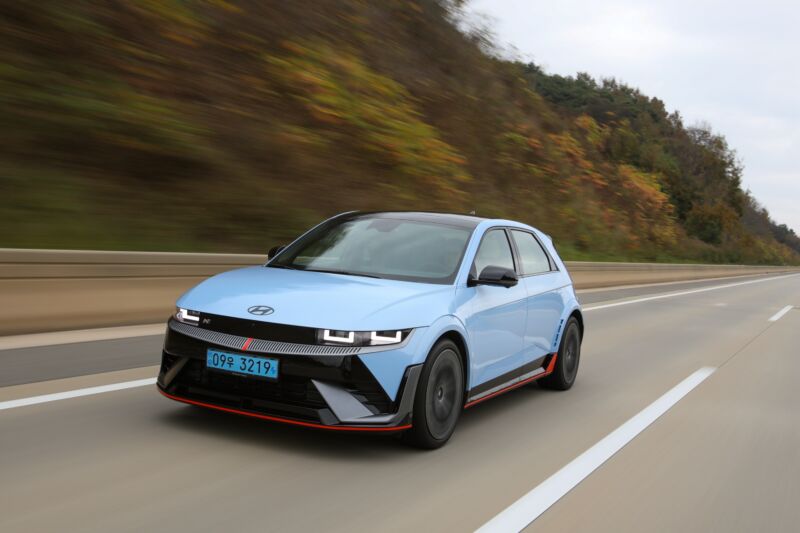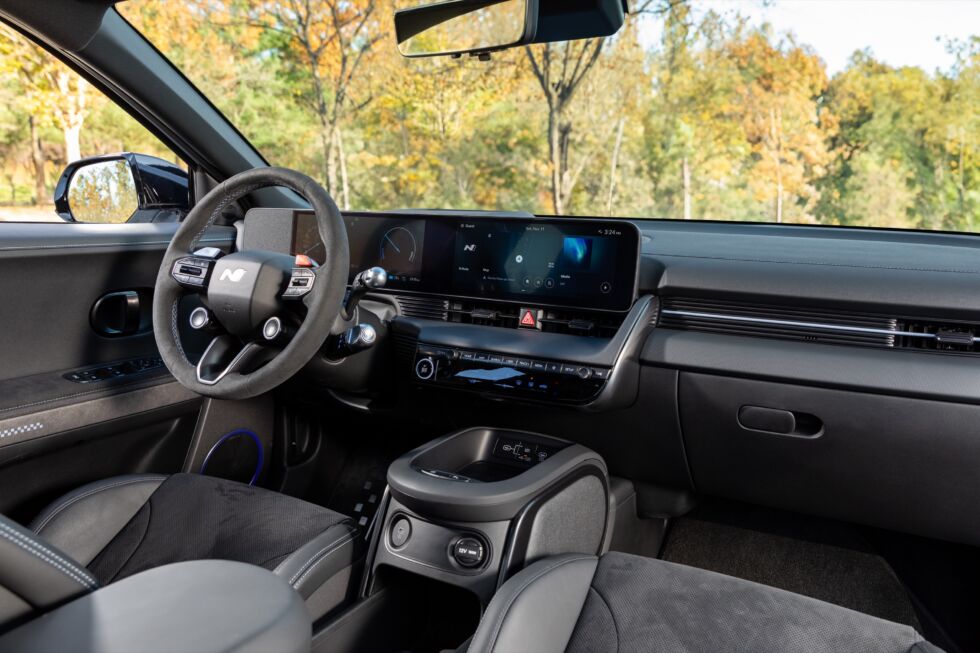Fake gearshifts and powertrain noises enhance Hyundai’s electric hot hatch—mostly.

25WITHHyundai provided flights and accommodation from Los Angeles to Seoul for Steve to drive the Hyundai Ioniq 5 N. Ars does not accept paid editorial content.
SEOUL, South Korea—EV drivers either seem to love or hate the fake powertrain sounds that accompany their cars. Some fully embrace the spaceship or video-game-like noises, while others can’t turn them off fast enough. I’m firmly in the latter group, long believing that the best thing about an EV is its dead-silent operation. Or, at least, I was until I drove the new Hyundai Ioniq 5 N earlier this month.
When you put the Ioniq 5 in N mode, it calls up a few different sound profiles—everything from your typical spaceship-y wooh-ahh tones to something attempting to re-create the aural quality of a turbocharged hot hatch. I say “attempting” because, well, none of the soundtracks are particularly good or high-quality. I’ve heard better stuff in Gran Turismo. Like, the first Gran Turismo.
In any case, when you activate N mode, the 12.3-inch digital gauge cluster also displays a tachometer in the middle, complete with a needle that rests at an imaginary idle. The regenerative braking paddles mounted to the steering wheel suddenly become gear shifters, and the sound of the “engine” rises and lowers as you move through each “gear.” (Read all these as air quotes—it helps.)
You can bang the tach needle off the “rev limited” and the Ioniq 5 N’s torque delivery cuts just like it would in an internal combustion car. Deep down, I know this is all a ruse—a fake bit of software programming designed to trick my brain. But I’m letting it—and enjoying it. These stupid fake sounds and stupid fake shifts are legitimately fun.Advertisement

Hyundai calls this technology N E-Shift, and you can turn it off if you prefer a more traditional EV driving experience. But combined with the soundtrack of what’s supposed to be a little turbo engine, I love the feeling of slapping through the gears. Whenever I turn E-Shift off, my brain keeps thinking I’m ‘revving’ too high and I need to upshift. And when I turn the N E-Shift and N Active Sound off, I’m not having as much fun. These two otherwise superfluous features really add to the Ioniq 5 N experience.
And what an experience it is. All of Hyundai’s gas-powered N cars—the Elantra N, Kona N, and dearly departed Veloster N—have a raucous, rowdy personality, and the company has managed to keep this alive and well in the electric Ioniq 5. The steering is properly heavy and quick, the chassis is borderline too stiff for city streets, and the car loves being tossed hard into corners. You quickly forget that the Ioniq 5 N is a 2.2-ton crossover the size of a Hyundai Tucson.
That it looks like a proper hot hatch only helps to seal the deal. I love the little red accents around the body, not to mention the big 21-inch wheels pushed out to all four corners. Inside, supportive Alcantara-lined seats keep the front passengers nicely in place, though the N loses the regular Ioniq 5’s interesting sliding center console simply to save weight.Advertisement
- On track you can really explore the Ioniq 5 N’s handling envelope, although our track time was sadly quite limited. Hyundai
- It’s still a great EV for urban life. Hyundai
- Hyundai
- Big brakes and red calipers. Hyundai
The Ioniq 5 N has an 84-kWh battery and two electric motors, providing a combined output of 601 hp (448 kW) and 545 lb-ft (739 Nm) of torque. Pushing the N Grin Boost button on the steering wheel can up that ferocity to 641 hp (478 kW) for short bursts, allowing the Ioniq 5 N to hit 60 mph in 3.3 seconds.
Like the standard Ioniq 5, the N is super quick in another important area: charging. Assuming you find a Level 3 public charger that works correctly, the Ioniq 5 N can juice up at a maximum rate of 238 kW, meaning the battery can theoretically go from a 10 percent to 80 percent state of charge in as little as 18 minutes.
Hyundai says the 5 N’s battery has enhanced thermal management characteristics to help it better stand up to extended track stints, but seeing as how the company only let me have seven short laps around a Korean race circuit at not even close to full-attack intensity, I can’t really speak to the longevity of the battery’s performance. I do like that Hyundai at least tapped into the Ioniq 5 N’s regenerative braking system to increase stopping power up to 0.6 G (from 0.3 G in the regular car) during track use in an effort to reduce mechanical brake fade.
The Ioniq 5 N arrives at North American dealers next March, and while pricing isn’t available just yet, expect it to command a pretty penny over the standard Ioniq 5—my best guess is an MSRP of around $65,000. That said, considering how much fun this car is and its visceral involvement, it’s an electric sports car unlike any other.




